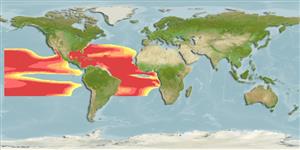>
Stomiiformes (Lightfishes and dragonfishes) >
Stomiidae (Barbeled dragonfishes) > Melanostomiinae
Etymology: Eustomias: Greek, eu = good + Greek, stoma = mouth (Ref. 45335).
Environment: milieu / climate zone / depth range / distribution range
Ecologia
marinhas; intervalo de profundidade 0 - 500 m (Ref. 58018). Tropical; 37°N - 25°S
Western Central Atlantic: roughly between 20-35°N and 35-90°W. South Atlantic: within 0-25°S and 0-30°W. Also known from the western Indian (1 record) and Pacific oceans; near Hawaii and south of the equator in the eastern Pacific.
Tamanho / Peso / Idade
Maturity: Lm ? range ? - ? cm
Max length : 19.8 cm SL macho/indeterminado; (Ref. 4468)
Descrição suscinta
Morfologia | Morfometria
Raios dorsais (total): 22-26; Raios anais : 37 - 42. Body slender and elongate; body depth 6.7-9.1% SL. Head length 11.4-14.4% SL. Lower jaw about as long as upper jaw. Long, tapering, protrusible snout. Chin barbel 11.2-12.9% SL. Barbel with slender stem, 3 branches, and a globular terminal bulb. Branches located medial to bulb and are slightly shorter to slightly longer than distance from base of branches to tip of barbel, and bear several side branches. Terminal bulb with several branched filaments near tip. Two tightly bound pectoral rays (Ref. 37039).
Mesopelagic (Ref. 58302).
Ciclo de vida ou comportamento de acasalamento
Maturidade | Reprodução | Desova | Ovos | Fecundidade | Larvas
Clarke, T.A., 2000. Review of nine species of North Atlantic Eustomias, subgenus Dinematochirus (Pisces: Stomiidae), with the description of two new species. Copeia 2000(1):96-111. (Ref. 36852)
Status na Lista Vermelha da UICN (Ref. 130435)
Ameaça para os humanos
Harmless
Uso pelos humanos
Mais informação
Nomes comunsSinônimosMetabolismoPredadoresEcotoxicologiaReproduçãoMaturidadeDesovaAgregação de desovaFecundidadeOvosDesenvolvimento dos ovos
Idade/TamanhoCrescimentoPeso-comprimentoComprimento-comprimentoFrequências de comprimentoMorfometriaMorfologiaLarvasDinâmica larvalRecrutamentoAbundânciaBRUVS
ReferênciasAquaculturaPerfil para aquaculturaEstirpesGenéticaElectrophoresesHereditariedadeDoençasProcessamentoNutrientsConversão de massa
ColaboradoresFotosStamps, Coins Misc.SonsCiguateraVelocidadeTipo de nataçãoÁrea branquialOtólitosCérebrosVisão
Ferramentas
Relatórios especiais
Baixar XML
Fontes da internet
Estimates based on models
Preferred temperature (Ref.
123201): 14.8 - 26.5, mean 21.4 °C (based on 159 cells).
Índice de diversidade filogenética (Ref.
82804): PD
50 = 0.5000 [Uniqueness, from 0.5 = low to 2.0 = high].
Bayesian length-weight: a=0.00302 (0.00117 - 0.00783), b=3.12 (2.89 - 3.35), in cm total length, based on LWR estimates for this (Sub)family-body shape (Ref.
93245).
Nível Trófico (Ref.
69278): 4.2 ±0.73 se; based on food items.
Resiliência (Ref.
120179): médio(a), tempo mínimo de duplicação da população 1,4 - 4,4 anos (Preliminary K or Fecundity.).
Fishing Vulnerability (Ref.
59153): Low vulnerability (14 of 100).
